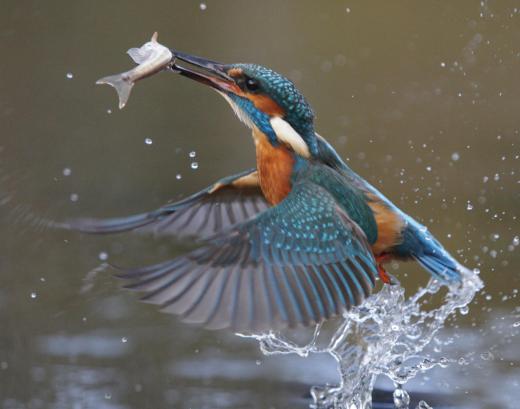What is Marine Ecology?
Marine ecology is the branch of ecological science concerned with organisms that live in or near the ocean, their behaviors, and their interactions with the environment. The scope of studies in marine ecology can range greatly, from examining unicellular microorganisms to researching global effects of pollution and human activity. Scientists might observe a specific population of organisms, identifying their behaviors and relationships, or investigate entire marine habitats to see how different living and nonliving factors contribute to the overall ecosystem.
Researchers who study marine ecology often concentrate on animal behavior and adaptations. For example, a scientist might observe a certain population of marine organisms to discover how they find food, mate, interact with other species, and adapt to environmental conditions. He or she may revisit a group of organisms over time to evaluate their reproductive success, migration patterns, population numbers, and their responses to different types of weather.

Scientists who specialize in ecosystem ecology might spend months or even years researching a specific region, such as a shoreline, to discover the various impacts that both living and nonliving components have on the local environment. They investigate the different types of native plants and animals and their interactions within an ecosystem. Marine scientists frequently consider the effects of nonliving variables, such as light, temperature, and water salinity, on populations of living things. They may also try to determine how human actions and nonnative marine species effect the wellbeing of an ecosystem.

In addition to field observations and studies, marine ecology can occur in a laboratory setting. Marine ecologists commonly employ microscopes and other laboratory equipment to analyze samples of soil, air, water, and living matter. They may try to determine how pollution levels or water quality have changed over time, and how different organisms have adapted to such environmental changes. Laboratory scientists study bacteria, algae, or other microorganisms to learn more about their roles in an ecosystem.

Many marine ecologists work for government agencies and nonprofit environmental organizations to promote conservation and protection efforts. Marine ecology experts working for the government often give tours, speeches, and seminars to educate the general public about the importance of marine ecosystems and what people can do to better protect them. Those working for nonprofit organizations might lead cleanup projects to restore damaged shores and tide pools. An educated, concerned population can take many steps to ensure that marine plants, animals, and their environments will continue to thrive.
AS FEATURED ON:
AS FEATURED ON:














Discussion Comments
My niece always talks about becoming a marine biologist when she grows up. I think it' really cool that a kid would want to do something good for animals and the environment instead of trying to be a teen pop idol like so many girls seem obsessed with doing these days.
Marine ecology affects everybody in the world, whether we'll admit to it or not. If the ocean gets polluted enough, not only will seafood end up filled with dangerous toxins, but the ocean could also get so imbalanced that whole species of plant and animal marine life could die off.
If that happens, not only will we be contributing to extinctions and losing biodiversity, but seafood may become something for the history books.
Last but not least, even if you live inland, if the ocean ecology gets out of whack than you'll feel it. The ocean is the biggest body of water on the planet, and it soaks into every continent -- it won't be long before pollution starts seeping into our soil and our crops on land.
Anyway, I think it's a great thing to encourage our kids to get into a job with substance, like marine ecology or marine biology, instead of a shallow materialistic lifestyle aiming to be the next pop star.
@turkay1-- I think marine ecology is a branch of marine biology. Biology means the study of life and ecology is the study of how life interacts in an environment. So marine biology must study marine life, whereas marine ecology is about how marine life interacts with the ocean.
I'm not too sure on your question about temperature. But I did read somewhere once that organisms in the ocean grow faster when the water is warmer. But it might have both good and bad affects on organisms depending on what the temperature change is.
If the water temperature rises, the salinity goes up too because the water will evaporate more. That would affect organisms too.
I'm working on an assignment for class. Can you tell me why temperature is important in marine ecology? And how does it relate to other things like the saltiness of water?
I am trying to find information online and I see a lot of information about "marine biology." What's the difference between biology and ecology?
I live on the coast, our house is just by the beach where the Caretta Caretta lay their eggs every year. Caretta Caretta are an endangered species of sea turtles. We have marine ecologists here that observe the turtles every year in the summertime to see how many eggs they lay and their hatching times.
They also coordinate with the local government to help protect the eggs. Gov't workers control the beaches early every morning during mating season and place protective pieces on top of the areas where eggs have been laid.
The Caretta Caretta are also really interesting because they arrive at the same exact beach where they were born after 30 years to lay their eggs. If the beach has changed extremely in appearance or if their is some sort of an establishment on the sand, the turtles may not be able to lay eggs.
That's why the marine ecologists have to work with the local government and environmentally conscious locals to help provide the right environment for them. If the marine ecologists didn't work so hard to protect the Caretta Caretta, they might have become extinct already by now.
Post your comments